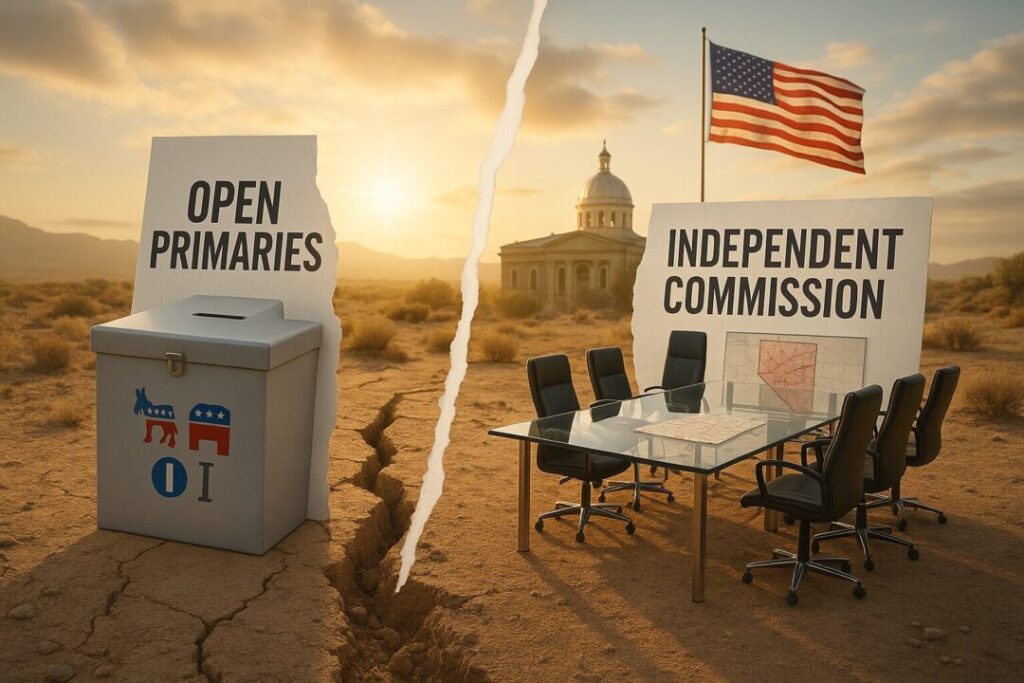The group Vote Nevada PAC filed two petitions this week, both aimed at changing the Nevada Constitution.
One would bring open primaries to the state. The other would create an independent redistricting commission.
For either measure to appear on the November 2026 ballot, the PAC must collect about 149,000 valid signatures.
And even if they make the ballot, each measure would have to pass twice – once in 2026 and again in 2028 – to become law.
First Petition: Open Primaries
This proposal would add a single sentence to Article II, Section 1A of the Nevada Constitution, which lists the “Rights of Voters.”
Here’s how the petition summarizes it:
- Back in 2020, Nevada voters approved a “Voter Bill of Rights” that listed 11 rights for eligible voters.
- One of those rights promises “equal access to the election system without discrimination.”
- However, current law doesn’t specifically mention voters based on political affiliation.
The amendment would fix that by saying all voters – no matter their party or lack of one – have the right to participate in any publicly funded election, including primaries.
Under this system, voters wouldn’t have to switch parties just to cast a primary ballot.
But there is a twist: political parties, as private organizations, could still hold their own closed nominating contests if they wanted—similar to presidential caucuses.
The catch? They’d have to fund those themselves instead of relying on taxpayers.
The Key Issues
- Right now: Nevada holds closed primaries. Republicans vote for Republicans, Democrats for Democrats. These elections are run and paid for by the state.
- If this passes: All taxpayer-funded primaries would be open to everyone. Primaries like these are called “jungle primaries”, similar to California’s system.
- Parties’ choice: If Democrats or Republicans want to keep things closed, they’d have to pay for a separate private caucus. That would shift a big financial burden to the parties. In addition, one could argue that it violates the citizen’s first amendment rights “to peaceably assemble” as a political party.
- Recent history: Just last year, Nevadans voted against ranked choice voting (Ballot Measure #3), which only works with open primaries. The measure failed 53% to 47%.
- Governor’s stance: During the 2025 Legislature, Gov. Joe Lombardo vetoed AB597, which also called for open primaries.
Bottom line: Voters have already signaled they don’t want open primaries, and this petition faces an uphill climb.
Second Petition: Independent Redistricting Commission
The second proposal would change Section 5 of the Nevada Constitution by adding three new sections: 5A, 5B, and 5C.
Here’s the summary from the petition:
- A seven-member commission would be created to draw the state’s Senate, Assembly, and U.S. House districts.
- Four members would be appointed by the legislative leaders. The other three would be people unaffiliated with the two biggest parties, chosen by the first four commissioners.
- Commissioners couldn’t be partisan candidates, lobbyists, or close relatives of either.
- Meetings would be open to the public, with opportunities for citizens to weigh in.
- Districts would have to follow the U.S. Constitution, have roughly equal populations, be compact and contiguous, respect “communities of interest,” and not unfairly benefit one political party. They’d also need to encourage political competitiveness.
- Redistricting would happen every ten years after the census. The commission would be funded by state dollars.
The Key Issues
- Nevada’s history: Redistricting has long been criticized as partisan and secretive. Lawmakers – currently Democrats in both chambers – draw the maps behind closed doors. The public has almost no real influence.
- The numbers: Nevada Republican Party Chair Michael McDonald points out that in 2024, Republicans for Congress earned 158,719 more votes statewide than Democrats (48.5% vs. 37.4%), yet Democrats hold 75% of congressional seats.
- The same imbalance shows up in the Legislature where, today, Democrats are just one seat away from a supermajority in both chambers. If a supermajority were to happen after the 2026 elections, it would prevent the Governor from vetoing any bill he deems unacceptable.
- And as you probably know, in 2025 Governor Joe Lombardo vetoed 87 bills.
- National context: This push also ties into what’s happening federally. The 2030 Census will shape redistricting for decades. President Trump recently ordered the Department of Commerce to prepare a new, corrected census that excludes illegal aliens and fixes flaws from 2020.
- The Center for Renewing America argues the 2020 census miscounted populations, skewing representation in favor of blue states and counties. Special calculations were added in the mix that changed final results, thereby favoring the Democrat party representation overall. You can read their report here.
- Millions of illegal immigrants brought in during the Biden years could distort future counts if they remain included. Redistricting should only reflect citizens.
- Potential issue: The petition says the commission must comply with the Nevada Constitution “to the extent possible.” That wording is vague. Either you comply or you don’t. This loophole could shield the commission from accountability and block lawsuits. That phrase should probably be removed.
Bottom line: Nevada’s current redistricting process isn’t transparent, and this proposal could bring sunlight and fairness. But it needs a few fixes before voters can have confidence in it.
IN SUMMARY
These two petitions take very different approaches.
The open primaries measure seems to go against what voters have already said they want.
The independent redistricting commission, while imperfect, could be a step toward transparency in how our districts are drawn.
With the 2030 Census looming, the stakes couldn’t be higher.
The opinions expressed by contributors are their own and do not necessarily represent the views of Nevada News & Views. This article was written with the assistance of AI. Please verify information and consult additional sources as needed.




